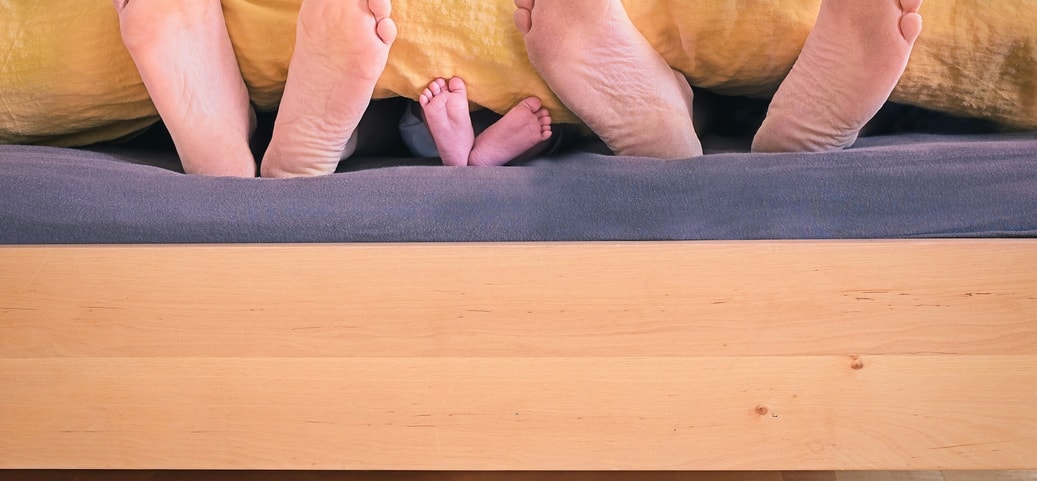Co-sleeping: why children should sleep in their parents’ bed
Sleep is quite often a hot topic when a new family member arrives. Especially in Western cultures, many families still believe that children and babies should sleep in their own bed, preferably in their own room. Scientists and midwives are now recommending the exact opposite. Read on to find out the benefits of a shared bed and why the supposed co-sleeping trend is the most primal way of sleeping.
by CALIDA
May 1, 2024•5 min reading time

Intimate bonding: The reasons why co-sleeping strengthens trust between parents and children.
Table of Contents
Co-sleeping, family bed, etc.: what does all this actually mean?
• Co-sleeping is not a new trend
The benefits of co-sleeping at a glance
• No getting up during the night
• Less frequent and shorter crying episodes
• Supports the child’s bodily functions
• Greater self-confidence and basic trust
Co-sleeping, family bed, etc.: what does all this actually mean?
With co-sleeping, children sometimes sleep in their parents’ bed or in the immediate vicinity of their caregivers – in a co-sleeper, for example – up to nursery age and beyond. This type of sleeping was hardly practised until a few years ago, since it was thought that children would become spoilt as a result of the constant proximity and that they would get too used to their parents’ bed.
If you look even further back in time or take a look at other cultures, however, you realise something: children sleeping in their own beds is a modern phenomenon of Western cultures. Many parents feel they need to make use of the luxury of the child’s room as soon as possible.
In addition, many parents still worry about the safety of their children when they sleep on the same mattress as them. We will also explain in this article how to co-sleep in a safe manner, as well as how it can contribute to your child’s health.
Co-sleeping is not a new trend
Even for our ancestors, co-sleeping was the only way to protect their children from animals and other dangers. It was perfectly natural for them to carry their defenceless newborns on them as soon as night began to fall.
Even if we no longer have to fear sabre-toothed predators today, the need to protect and provide safety for our little ones is still deeply ingrained in us. Infants haven’t known the world outside the warm womb for very long. Their mother’s heartbeat and breathing sounds give them the security they need for a restful sleep.
The benefits of co-sleeping at a glance
It’s not just our little ones that benefit from sleeping in the same bed. Read on to find out about the benefits of co-sleeping for parents, as well as the long-term positive effects of sleeping in a family bed.
No getting up during the night
The first advantage applies particularly to breastfeeding mothers, who provide their child with nutritious breast milk at any time and anywhere during the first few months of life. Co-sleeping is highly recommended so that you don’t have to keep getting up at night to breastfeed. This makes it easy for you to bring the baby to your chest, feed them and continue to doze in the meantime.
In addition to making breastfeeding extra simple, co-sleeping also has advantages for your baby’s development. The constant smell of milk encourages them to drink more often, allowing your child to absorb vital nutrients and antibodies that strengthen the immune system.
Less frequent and shorter crying episodes
If your baby wakes up alone in their own bed, they draw attention to themselves by crying. When this happens, the presence of the parents is the only thing that will calm them down. Co-sleeping means you don’t have to get out of bed to comfort your child. They immediately realise that their caregivers are nearby and can calm down more quickly.
Supports the child’s bodily functions
Newborns first have to get used to breathing regularly, especially in their sleep. This works best when they lie next to their parents and can hear the breathing sounds. What’s more, your child’s heartbeat adapts to your own pulse, which is very rhythmic and calm during sleep and is also transferred to your baby.
Your child’s body temperature can also be checked better and more regularly if you are lying next to them. The temperature of their neck reveals whether your child is cold or possibly sweating. A temperature that’s too high in particular can cause overheating, which can be dangerous for infants, as they do not wake up on their own when this happens. Many co-sleeping mothers even check their child’s temperature and well-being automatically while they sleep.
Greater self-confidence and basic trust
Parents are often afraid of coddling their children by co-sleeping for too long. But rest assured, there is no such thing as too much proximity – quite the opposite! Children who sleep close to their parents develop a stronger sense of basic trust due to the constant presence and security of their caregivers. This also boosts their self-confidence, which can have a positive effect on them later in life.
Safe and sound: what to be aware of when co-sleeping
As already mentioned, there are some risk factors that should be taken care of to keep your baby safe during co-sleeping. To ensure that you and your baby get a safe and relaxing sleep, consider the following:
Your baby should sleep in a sleeping bag (no pillows, blankets or cuddly toys).
Have your baby lying on their back as long as they can’t lift/turn their head.
Your baby’s head should be level with your head or higher.
No soft/sagging mattress, no waterbed, no sofa and no gaps in the bed/mattress.
Your baby should sleep on the edge of the bed with a barrier/co-sleeper (not between the parents or next to siblings).
The bed should not be placed anywhere near a draught.
Of course, all these points also apply if your child sleeps in their own bed. The advantage of co-sleeping is that you have a better view of your baby’s sleeping environment and don’t have to get up to check that everything is okay. This ensures a more peaceful sleep so that everyone feels well rested and fit the next morning.
When should children start sleeping in their own bed?
How long children should sleep with their parents is an individual decision and, above all, depends on your child. Even if you decide against co-sleeping or your baby shouldn’t sleep in your bed for health reasons, that’s perfectly fine. Every family has to find a solution that everyone feels comfortable with and that doesn’t put your child at risk.
If you are flexible about moving your child out of the family bed, you will find that with time, your child will probably want to leave of their own accord. You may also notice that your child is starting to wake up more often because of your movements and sleeps more restlessly in the family bed than before – this may be the right time to move them to the cot.
When moving them from your bedroom to their own room, always be sure to take a slow and gentle approach. Don’t do it at a time when your child is going through major changes elsewhere. It also makes sense if your baby has been weaned for quite some time.
Discover more interesting blog posts:


